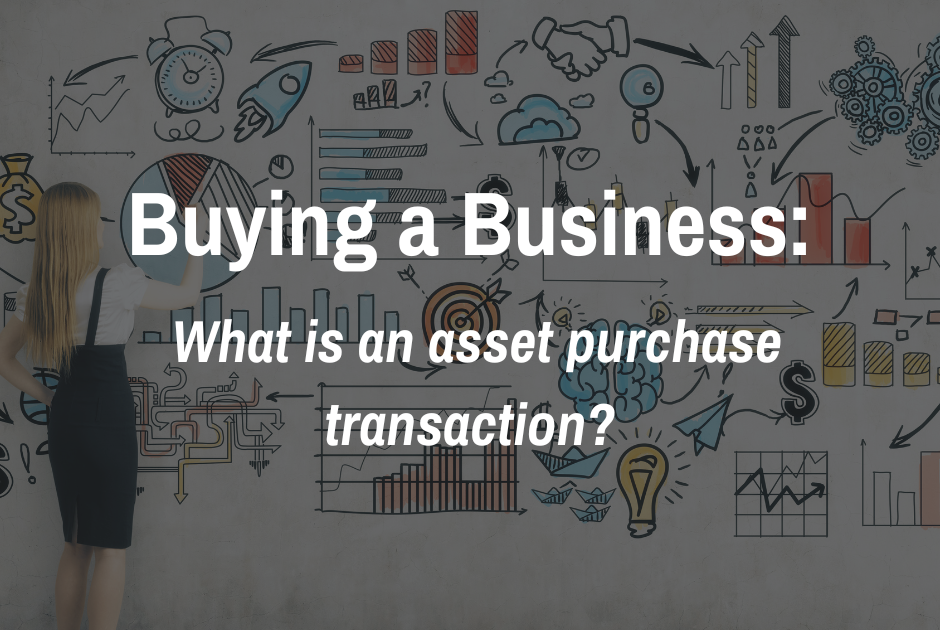ASSET PURCHASE
An asset purchase is an option available to an individual or business entity, known as the buyer, to acquire the assets of a business corporation. In this type of transaction, the buyer agrees to purchase and the seller agrees to sell specific assets and liabilities of the business. The assets could be tangible such as real estate properties, facilities, vehicles, equipment, and inventory or intangible, such as goodwill or intellectual property
DIFFERENCE BETWEEN ASSET PURCHASE AND SHARE PURCHASE
In simple terms, an asset purchase differs from a share purchase in that, in a share purchase, the buyer purchases the ownership of the corporation by buying its shares, while in an asset purchase, the buyer purchases the assets of the business.
THE ASSET PURCHASE AGREEMENT
Buyers and sellers typically use an asset purchase agreement to document the transfer of the ownership of the assets and record the terms and conditions that govern the purchase and sale transaction.
The asset purchase agreement should be as detailed as possible. Both parties to the agreement would benefit from a detailed and unambiguous agreement that properly describes the parties to the agreement, the assets to be purchased, and the rights and responsibilities of each party to the transaction. If there are ambiguous terms in the agreement, either party may take advantage of that in the future. So, it is important to avoid ambiguity and grey areas.
Parties to an asset purchase agreement may include in the agreement as many details as required in their situation. The following are 7 essential details to include:
1. THE PARTIES TO THE ASSET PURCHASE AGREEMENT
A well-drafted asset purchase agreement properly identifies the parties to the agreement. This would include their legal names and addresses. This is fundamental. If the buyer is a business entity, the agreement should state that and list the capacity of the parties representing the corporation.
2. WHAT ASSETS ARE BEING PURCHASED?
The assets to be purchased should be listed and described in detail. The last thing the buyer or seller wants is a misconception about the asset being purchased or sold. If the asset is a landed property, for example, the municipal address, the exact location of the property should be fully described.
3. THE PURCHASE PRICE
The purchase price is an integral aspect of an asset purchase agreement. The price that the parties agreed to should be expressly stated. How the purchase price would be paid should also be listed; would there be financing? would there be price adjustments after closing? Is the buyer paying the purchase price in instalments with a portion paid at closing and the balance secured with a promissory note or would security be registered under the PPSA and a general security agreement be needed? All these should be clearly detailed in the asset purchase agreement.
4. REPRESENTATIONS AND WARRANTIES
The reps and warranties section of the agreement should list the assumptions that each party to the agreement is relying on as they enter into the transaction. Reps and warranties would cover details including, the legal status and standing of the buyer and seller, the authority of the seller to undertake the transaction, the seller’s clear title to the assets that are being sold, the fitness of the asset for its purpose, and condition or quality of the assets being sold.
5. GOVERNING LAW
The asset purchase agreement is incomplete without a clause indicating the law that would govern the contract. This becomes extremely useful if a dispute arises between the parties down the line.
6. CLOSING DATE
The transaction is not one that goes on perpetually, there should be an agreed closing date when the transactions are concluded, all documents are signed and monies exchange hands. If the closing date differs from the effective date, the agreement should clearly state it. The effective date is the day that the agreement becomes binding on the parties and depending on the nature of the transaction, it might be different from the closing date.
7. SIGNATURES
The agreement should be dated and signed by the parties to it. The authorized signing officer would sign for the corporate parties to the transaction.
Buying and selling the assets of a business entity is a complex transaction. An important step towards a successful asset purchase and sale is to have the agreement negotiated and drafted by a competent and knowledgeable business lawyer. The business lawyers at Rabideau Law assist businesses and individuals as they navigate the asset purchase process while protecting their interests.
Written by Jumi D. Odepe
Jumi is a corporate lawyer at Rabideau Law. She represents businesses and investors in the formation and structuring of business entities, buying and selling of businesses, reorganizations, and various contractual and service agreements. To reach her, call 519-957-1001 or email info@rabideaulaw.ca
The blog published by Rabideau Law is intended as general information only and does not serve as legal advice. By viewing the blog posts, the reader understands there is no solicitor-client relationship established. Readers should consult the business lawyers at Rabideau Law for their legal questions and concerns.

